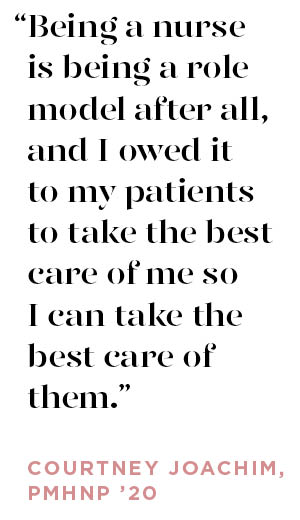
STORY BY ASHLEY STARR | PHOTOS BY REBECCA ROSE
Throughout the COVID-19 pandemic, nurses are working relentlessly on the front lines to keep communities safe—making unimaginable sacrifices to save lives amid a global health crisis. But who is taking care of them?
It’s a question that Courtney Joachim, PMHNP ’20 set out to answer. At just 22 years old, she had recently graduated with her Bachelor of Science in Nursing and was working as a registered nurse at Massachusetts General Hospital (MGH) when she found herself sitting in her car at the beginning of every shift crying—and trying to find the willpower to walk into the hospital.
“I was getting more and more anxious going to work,” Joachim recalls. “I was lucky to get a sip of water in each shift and I was sleeping less and
less on work nights, which made me extremely irritable during the day.”
When COVID-19 hit, Joachim’s already grueling schedule was amplified. Admitting these concerns to herself was hard enough for her—but saying
them out loud or asking for help seemed impossible, especially as she watched so many patients suffer with COVID-19. “Feelings of guilt and shame for not loving my job were constant.”
Joachim found herself in an endless cycle, sitting in her car outside the hospital day after day for nearly eight months before admitting that she was burnt out and ready to share her story and take action—not just for herself, but for all nurses.
MIND AND BODY
When Joachim made the difficult—and what she can now define as “selfless”—decision to put herself first, she cut her hours working at the hospital and decided to try a different approach.
“I began to trust my gut and turn down the noise of everyone around me,” Joachim says. The process led Joachim to Regis College for the Psychiatric-Mental Health Nurse Practitioner (PMHNP) track to pursue her passion of breaking down the stigma attached to mental health.
Joachim was inspired to learn from faculty and fellow Regis students who felt strongly about serving others and supporting the nursing community. “Not only does Regis have a renowned nursing program but it is close to my hometown of Concord, Massachusetts,” she explains. “I really wanted to learn in my community to be of the most service and give back.”
Going into the psychiatric field transformed the way Joachim viewed the nursing profession and how she thought about serving her patients.
“It was hard managing someone’s blood pressure only to realize they couldn’t or wouldn’t take care of themselves,” says Joachim. “I wanted to get to the root of the issue and understand why they didn’t want to take care of themselves so I could help them be as happy and healthy as possible—both physically and mentally.”
FOR NURSES, BY NURSES
Joachim was looking for an outlet—a place where she could connect with other nurses to share her experiences and feelings. When she turned to social media, she found that she quickly gained followers who shared similar stories. She had organically found an inclusive community: a safe space to “get real” about the challenges nurses face and shift the conversation to mental health. And right then and there the idea of Shift Change was born. Joachim founded a genuine and knowledgeable company that works with nurses in the health care field who are ready to prioritize their mental health.
“I realized there is a serious lack of resources for nurses in dealing with these things, so I shifted my focus to creating a program that reflects all of the things that have been helpful to me,” Joachim says.
She credits Regis for providing not only the clinical experiences necessary to launch Shift Change, but also the motivation, through the support of classmates and fellow nurses. “Regis gave me the tools to take care of myself—including taking breaks as needed and ensuring I’m always aligned with my purpose and why I chose nursing,” Joachim says.
Joachim hosts webinars about stress and burnout, as well as workout and mediation sessions to fully connect the mind and body. Her favorite part of Shift Change is her one-on-one, six-week mentoring program to break down the good, the bad, and the ugly of shift-working life. Being able to connect with other nurses and offer them the tools she wishes she had early in her career is why she began this venture.
INVESTING IN YOURSELF
Joachim has been blown away by the positive messages that flood her inbox. “As a nurse, I was struggling between taking care of others and finding the time to take care of myself,” shares one member of the Shift Change community. “I have learned that putting myself first isn’t selfish, it’s a necessity.”
Joachim aspires to make an even broader impact by having her mental wellness workshops integrated into nursing education and hospitals. “The hope is to change the culture of health care,” she says. “Nurses don’t always need to be this perfect, indestructible being. It’s okay to be human, because we are human.”
Joachim is currently working with an acute psychiatry team in the emergency department at MGH to help others navigate through their own mental health journey.
“Over the years, with a lot of reflection and hard work, I’ve gone down to the basics to learn about how I treat my body, how that influences my mindset, and how my mindset influences my body,” Joachim says. “Being a nurse is being a role model after all, and I owed it to my patients to take the best care of me so I can take the best care of them.”
PRIORITIZING MENTAL HEALTH
Courtney Joachim, PMHNP ’20 offers these tips:
- Focus on what you can control: how you treat yourself, how you show up, and what you do outside of work.
- Take time off to recharge and reflect: Take a vacation; stay home and spend time with your loved ones; get into nature and enjoy nature being free.
- Decrease work hours (if possible) or change your shift to better accommodate your life.
- Change your setting or specialty.
- Trust your gut: Know what triggers threaten your mental health and do not put yourself in a situation that would compromise that. If it is time to move on or get a different job to prioritize your mental health, do so. Follow your passions to keep your soul fulfilled.
- Continue learning: Try going back to school or joining a committee to explore a passion or rekindle your career.
- Be honest: If you’re able to be vulnerable, tell the truth. You might be surprised to find out you aren’t the only one experiencing what you’re feeling.
Visit shiftchangeco.co to learn more about Shift Change, and visit regiscollege.edu/nursing to learn more about the Young School of Nursing.
Read more articles
Read the entire magazine online